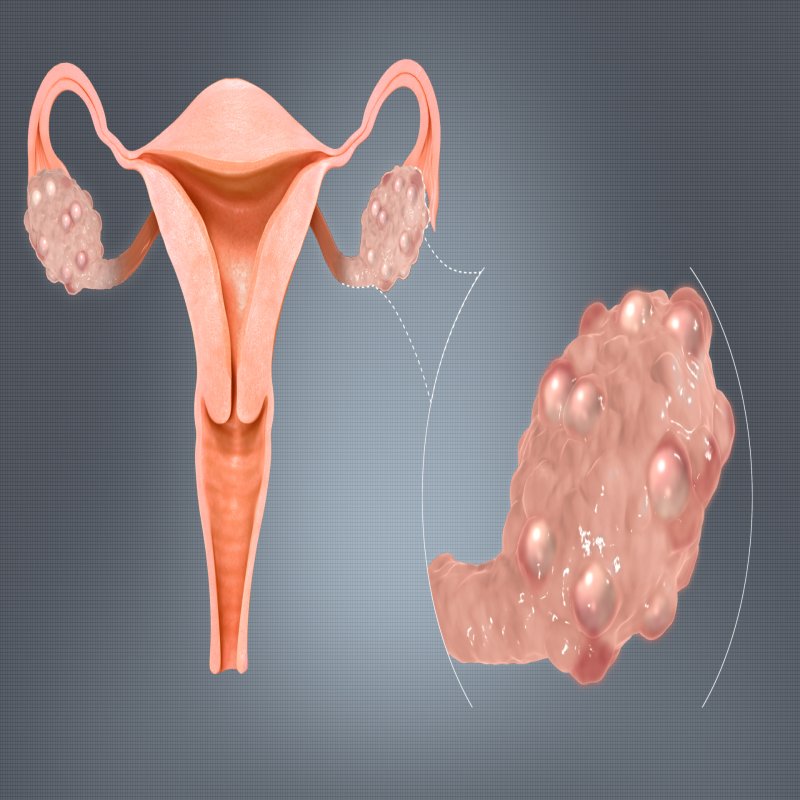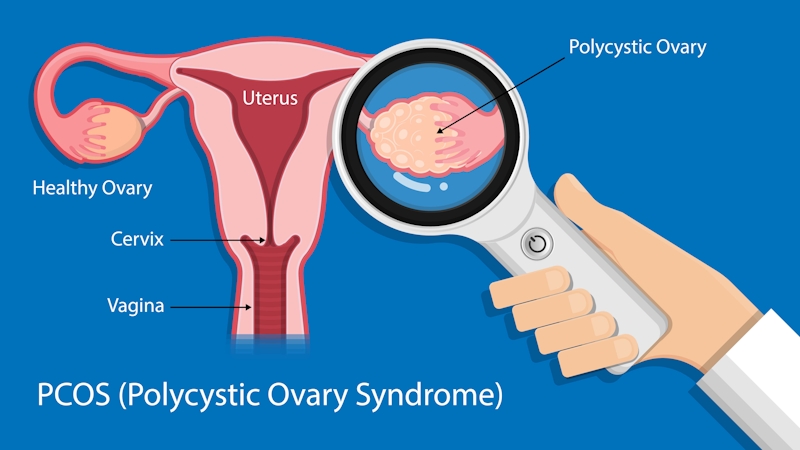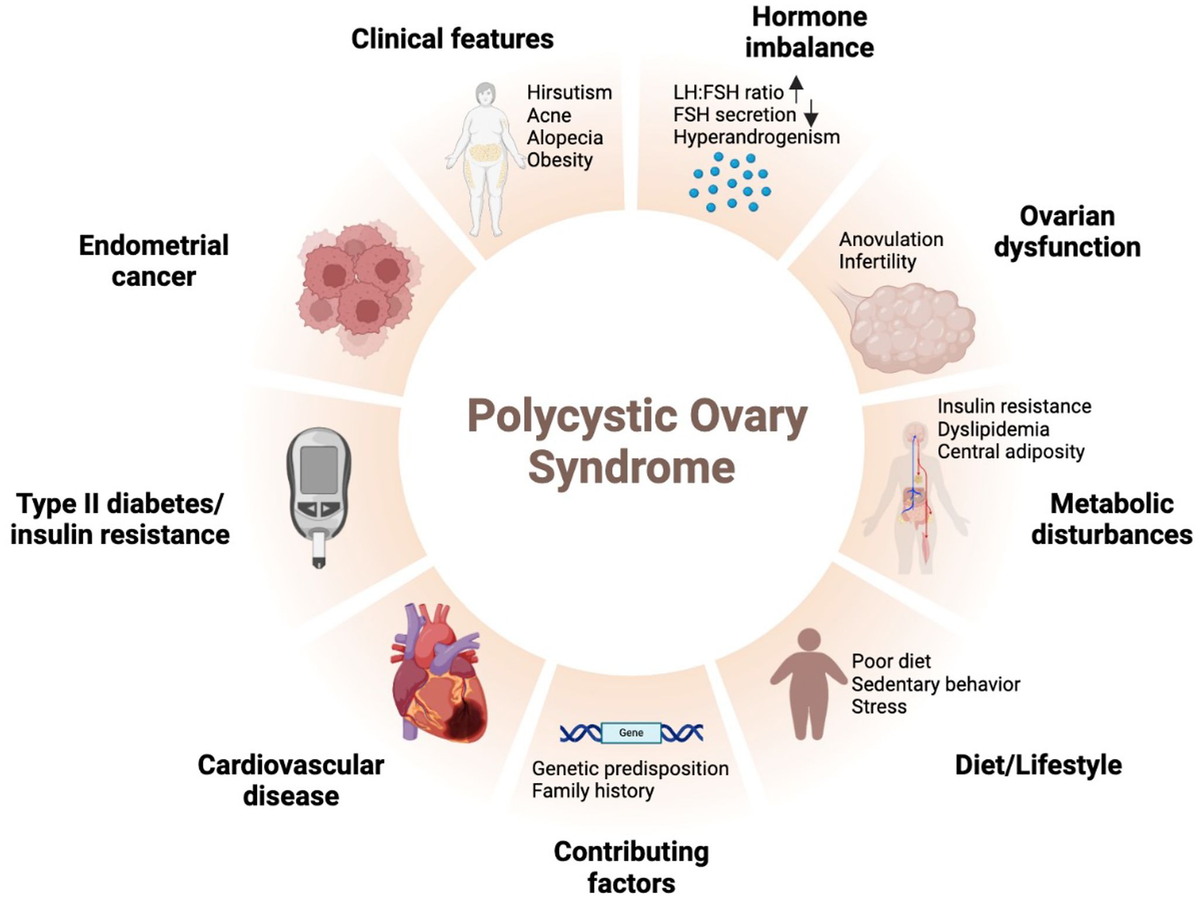
Polycystic Ovarian Syndrome
Ovarian dysfunction and hormonal imbalance cause Polycystic Ovarian Syndrome in reproductive-age women. Complications of polycystic ovarian syndrome include impaired glucose tolerance, obesity, cardiovascular disease, type 2 diabetes, hypertension, dyslipidemia, increased risk of miscarriage, preeclampsia, GDM, and pregnancy-induced hypertension. Irregular menstrual cycles, hyperandrogenism, hirsutism, and anovulation are some of the symptoms of polycystic ovarian syndrome. Diet and exercise are lifestyle modifications that are done as a part of the management of polycystic ovarian syndrome. It is then followed by the usage of medications and surgeries.
Supplements for Polycystic Ovarian Syndrome
Women with polycystic ovarian syndrome are said to be deficient in micronutrients i.e., vitamins and minerals. supplementing those vitamins and minerals helps to improve the symptoms, quality of life, and health of people having the polycystic ovarian syndrome.
- Vitamin A: Vitamin A is also called retinol. It is a fat-soluble vitamin. It plays an important role in antioxidant activity, steroid metabolism, oocyte nuclear maturation, and inhibition of cumulus cell apoptosis.
- Vitamin B: An essential amino acid homocysteine is derived from dietary methionine. Increased homocysteine levels pose an increased risk for reproductive and cardiovascular symptoms in polycystic ovarian syndrome. Three-month supplementation of folic acid and regular exercise for six months are found to be effective in reducing the elevated levels of homocysteine in obese and overweight women. Women taking Metformin for insulin resistance are deficient in Vitamin B12 and folic acid.
- Inositol: Inositol belongs to B vitamins and is also called sugar alcohol. Inositol supplementation provides alleviation in symptoms causing decreased androgen levels improved insulin levels and reproductive abnormalities.
- Vitamin D: Vitamin D is useful in the regulation of serotonin synthesis, skeletal growth, dental health, bone mineral density, regulation of calcium and phosphorus metabolism, and lower extremity functions. Obese women with polycystic ovarian syndrome tend to have low levels of 25-dihydroxy vitamin D levels. Vitamin D3 supplementation for three weeks posed no major changes other than improving insulin resistance. Whereas usage of a vitamin D3 analogue called as alphacalcidol showed an increased first phase of insulin secretion, increased serum high-density lipoprotein cholesterol profile, and decreased serum triglyceride levels.
- Calcium: Calcium is essential for oocyte maturation, egg activity, progression of follicular development & regulation of cell division in mammalian oocytes. Calcium deficiency causes insulin resistance in women affected with polycystic ovarian syndrome. Reduced body mass index was achieved in women having polycystic ovarian syndrome when combined supplementation was administered as follows: Calcium 1000 mg/day metformin 1500 mg/day and vitamin D 100,000 IU/month for 6 months.
- Chromium: Chromium is used in the treatment of type 2 diabetes, and hyperglycemia because chromium deficiency leads to insulin resistance and disorders in glucose homeostasis. Improved glucose tolerance was seen in patients with polycystic ovarian syndrome being supplemented with 200 µg chromium for three months.

Supplementing with specific nutrients like inositol has been found to help improve insulin levels, decrease androgen levels, and alleviate reproductive abnormalities in women with PCOS.
- Magnesium: Magnesium is an intracellular cation that regulates adenosine triphosphate --use, adenosine triphosphate -generation, deoxyribonucleic acid and ribonucleic acid synthesis, transphosphorylation reactions, ion homeostasis, insulin metabolism, cell growth, cytoskeletal function, and membrane structure.
- Selenium: Selenium insufficiency is seen in a polycystic ovarian syndrome that causes increased androgen levels such as luteinizing hormone and total testosterone levels. Reduction in insulin levels was seen in 200 µg per day selenium supplementation for 8 weeks.
- Zinc: Zinc plays a crucial role in insulin metabolism such as the secretion, storage, synthesis, function, conformational integrity, and action of insulin, and also zinc ions produce an insulin-like effect. Zinc deficiency causes obesity, diabetes, lipidemia, glucose intolerance, hyperglycemia, and hypertriglyceridemia. 50 mg/d of zinc supplemented for 8 weeks shows a reduction in levels of low-density lipoprotein cholesterol, serum total cholesterol, triglycerides, and triglyceride to high-density lipoprotein ratio.
- Omega 3 Fatty Acids: Omega 3 Fatty Acids are polyunsaturated fatty acids. α-linolenic acid, eicosapentaenoic acid, and docosahexaenoic acid are the most common omega 3 Fatty Acids. Omega-3 fatty acids reduce hypertension and oxidative stress, improve lipid profiles, and provide anti-inflammatory activity, such that they have a potential role against cardiovascular disease risk.
- Probiotics: Living microbial dietary supplements called probiotics are found in dairy products and have a good relationship with the gut microbiota. Recent studies show that probiotic consumption improves antioxidant status and fasting blood glucose in patients with type 2 diabetes.

Conclusion
Nutrient supplements are needed in the management of polycystic ovarian syndrome. Hence, the summarized nutrients in specific amounts for a specific duration provide a beneficial effect.
Frequently Asked Questions (FAQs)
1. Are supplements a substitute for a healthy diet and lifestyle in PCOS management?
Ans: While supplements can be beneficial, they should not replace a healthy diet and lifestyle. A balanced diet, regular exercise, and other lifestyle modifications are essential components of PCOS management.
2. Can supplements alone cure PCOS?
Ans: Supplements cannot cure PCOS, but they can help manage symptoms and improve overall health. A comprehensive approach that includes lifestyle changes, medication (if necessary), and regular medical check-ups is recommended.
3. Is it necessary to consult a healthcare professional before taking supplements for PCOS?
Ans: Yes, it is important to consult a healthcare professional before starting any supplementation regimen. They can assess your specific needs, recommend appropriate dosages, and ensure there are no potential interactions or contraindications with other medications or health conditions.
4. How long should one take supplements for PCOS?
Ans: The duration of supplementation may vary depending on individual needs and responses. It is advisable to follow the guidance of a healthcare professional who can monitor your progress and make necessary adjustments.


.png)


